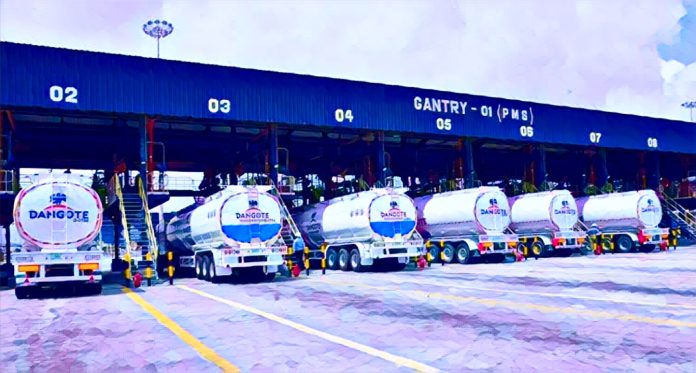KEY POINTS
- Dangote Refinery cuts petrol price to ₦828.
- New NNPC crude deal strengthens local supply.
- Move offers short-term relief to fuel marketers.
The Dangote Petroleum Refinery has cut its gantry price of Premium Motor Spirit (PMS), or petrol, to ₦828 per litre from ₦877, a 5.6 percent reduction.
The move comes even as global crude oil prices climbed to an average of $64 per barrel on Thursday, up from $62 the previous day.
Dangote Refinery petrol price drop follows NNPC deal
Industry checks revealed the drop stemmed from a reinforced crude supply agreement between Dangote Refinery and the Nigerian National Petroleum Company Limited (NNPC Ltd). The arrangement falls under the naira-for-crude framework, allowing domestic supply stability amid forex pressures.
Under the deal, NNPC Ltd will supply the 650,000-barrel-per-day refinery with five December-loading crude cargoes including Amenam, Bonny Light, Forcados, and Qua Iboe grades.
According to data from Petroleumprice.ng, the downward adjustment has already spurred optimism among marketers. Depot operators in Lagos confirmed that loading at the new rate began early Friday, with pump price adjustments expected across filling stations in the coming days.
Dangote Refinery petrol price remains below import parity
Reports from S&P Global Commodity Insights presented at the Major Energy Marketers Association of Nigeria (MEMAN) conference indicated that Dangote’s pricing remains below import parity levels.
As of October 17, 2025, the refinery’s gantry pricing of ₦877 per liter was still lower than both Lagos’ average “into-tank” cost and the cost of transferring goods from ship to ship (STS) at Lome, Togo.
The paper said that this price advantage shows how Dangote’s cost advantage is expanding in Nigeria’s deregulated petroleum market, even though global crude prices are still unstable because of sanctions on Russian oil and uneven demand.
It also noted a sharp drop in Nigeria’s fuel imports now below 200,000 barrels per day, down from about 500,000 barrels per day in early 2023.
S&P Global warned, however, that consistent regulatory oversight will be key to ensuring transparency and fair play as the domestic market shifts toward full liberalization.
The firm added that Nigeria’s downstream transformation continues to face operational and policy challenges but credited the new refining capacity as a major step toward energy self-sufficiency.



